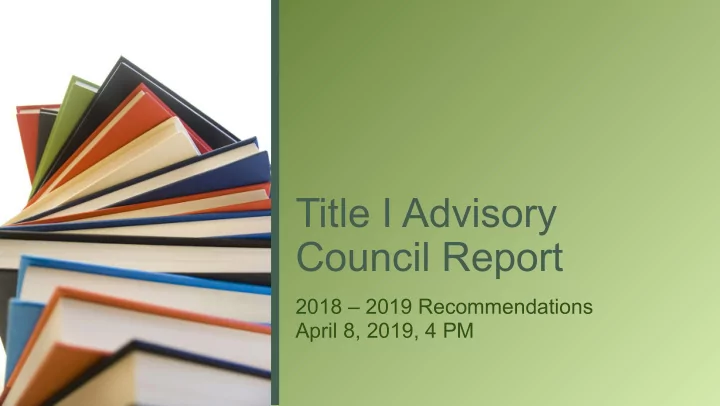

Title I Advisory Council Report 2018 – 2019 Recommendations April 8, 2019, 4 PM
Table of Content ● Introduction ● Purpose of TAC ● The TAC is…. ● Observations and Recommendations ● Next steps 2
Purpose of TAC The purpose of TAC is to assist the Superintendent and the School Board in making decisions pertaining to Title I schools in Leon County and to support and assist each Title I school in outlining and addressing the needs of their school community. 3
The TAC is... ● a representative body composed of parents, teachers, principals, district staff, and community members. ● deeply concerned with issues of inequity in our public schools. ● committed to discussing and drawing attention to issues and concerns identified by all stakeholders. ● dedicated to making recommendations for the most efficient and effective way to spend Title I funds, as well as recommendations for needed action beyond the Title I grant. ● determined to be an inclusive body in recognition of the need for multi-pronged approaches to address the challenges of Title I schools. 4
Source: Source: FLDOE, 2018 FLDOE, 2018
Priorities I - Attracting and Retaining experienced teachers in Title I schools II - Providing targeted + comprehensive access to quality pre-K programs III - Increasing parent and community involvement in Title I schools IV - Fostering cooperation between Title I schools V - Protecting the support given to struggling schools 8
I - Attracting and retaining experienced teachers in Title I schools Current situation: - 1/3 of all Leon County teachers (865) - teach in Title I schools. - Teachers receive $200 above base pay to work in Title I schools. - Many teachers stay because teaching in Title I schools is a calling; others leave to teach at a non-Title 1 school for a multitude of reasons. - Position postings do not attract an adequate pool of qualified applicants. - Title 1 Principals prefer to hire experienced teachers as they tend to stay in the position longer and have a better understanding of what is expected. 9
Incentives to retain experienced teachers in Title I schools ● Pay increase between the existing $200 and $10,000 using non -Title 1 funds*. If Title I dollars fund the increase, then classroom sizes would go up. ● Increased stipend for teachers to assist students with snacks, supplies etc. ● Update position description to acknowledge duties specific to Title I that warrant an increase in salary. *However, note that the Title I Roll Forward, $1,218,983.22, is enough for almost $1500 per teacher in Title I schools. 10
Incentives to attract experienced teachers in Title I schools ● Separate job postings for Title 1 schools ● Host job fair first for Title 1 schools ● Update school transfer guidelines to incentivize positions in Title 1 schools ● Develop student loan forgiveness/repayment program for teachers with experience who choose to teach in Title 1 schools ● District and schools could work with local businesses to offer signing bonuses (ex: a vehicle, weekend trips, summer training). 11
II - Provide targeted and comprehensive access to quality pre-K programs ● Increase access for 3 and 4 year olds to pre-K programs in their zoned schools to increase number of kindergarten-ready children in Title I schools - outreach to families in Title 1 school zones, collaborating with Whole Child Leon, Early Learning Coalition, Head Start, etc. - offering more screening opportunities and information about their zoned Title 1 school. ● Offer a full day for pre-K students. 12
source: Florida Department of Education
● Adopt a research-based, developmentally appropriate preschool curriculum that addresses cognitive, social and emotional needs in Leon County Schools. ● Increase parental engagement and empowerment in early childhood success - POP Up Preschool - Parent Education on brain development, ACES, Parent as Teacher - Outreach to Title 1 school zones 14
III - Increasing parent and community involvement in Title I schools ● Strengthening parent involvement institutions in our Title I schools (PTOs and SACs) by learning from best practices at other schools and keeping parents involved as they move from school to school. ● Increasing accessibility of meetings and activities for parents and community members: addressing issues of transportation, childcare, communication, availability, and relevance. 15
● Encouraging community engagement: maximizing volunteer hours, leveraging existing community resources, welcoming and facilitating participation. ● Recognising the daily involvement of parents in the home to support their children’s education success; starting from a place of appreciation and value for the work being done. 16
IV- Fostering cooperation between Title I schools ● Partnership and collaboration between schools: learning from models that work. ● Addressing the curriculum gaps that occur between Elementary and Middle and Middle and High. ● Transferring information effectively when a student moves from school to school. ● Keeping parents engaged as they move from one school level to the next (feeder pattern schools). 17
V- Protecting the support to struggling schools ● Submitting plans to access the new Turnaround School Supplemental Services Allocation (assuming passage of the bill). ● Leveraging resources in the community, and especially through the Universities. ● Measuring and striving for academic success more holistically and sustainably across all grade levels to counter the volatility of school grades: - An important way to achieve this is through smaller class sizes and investment in the earliest grades. 18
source: FL DOE
Where do we go from here ● Recognizing that the underlying issues cannot be tackled by the schools on their own; it has to be a community effort. ● Developing a process with the School Board for follow-up on the recommendations the School Board decides to implement. ● Ensuring the stable and continuous representation of schools and the community at large on the TAC. 20
Recommend
More recommend